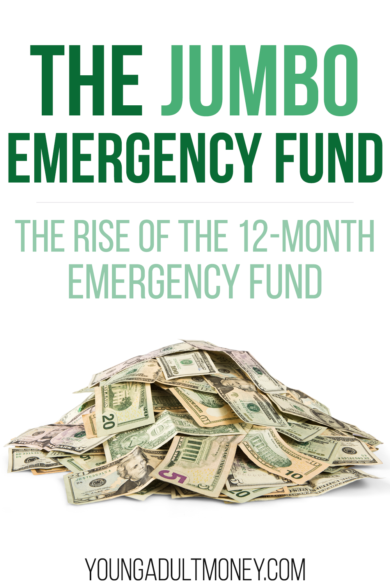 If there was ever a time for the emergency fund to shine, it is now.
If there was ever a time for the emergency fund to shine, it is now.
With COVID ravaging the world, businesses have been forced to close and do layoffs, leaving millions of people without a source of income.
During this time of enormous uncertainty and stress, people are relying on whatever savings they have. While any savings is certainly better than no savings, many people may wish they had more saved than the recommended 1 to 6 months of living expenses for times like these.
Enter the 12-month emergency fund, or “jumbo emergency fund” as we like to call it. Yes, it may seem like overkill in normal times, but can having a full year of expenses in savings really harm anything?
Is this jumbo emergency fund right for you? Here are some options to consider.
Traditional Emergency Fund Guidelines May Not Be Enough
The general financial guideline has always been to have 3 to 6 months of expenses in an emergency fund. Some financial experts, like Dave Ramsey, advocate for just a $1,000 emergency fund while you are paying off debt, and then bulking it up once you become debt-free.
But consider this: is $1,000 really enough to protect you if you lost your job? What about if the economy is struggling, making it challenging to find another job?
Chances are, $1,000 won’t get you very far. Once your emergency fund runs out, you may be forced to explore other, more expensive, options, such as relying on credit cards or cashing out your retirement funds just to get by.
And while a 3 to 6 month emergency fund will certainly get you much further, is it enough? Sure, it is enough to pay for many unexpected expenses, but what about a long-term loss of income?
Reasons to Have a 12-Month Emergency Fund
Given the new world we live in, a 12-month emergency fund would likely benefit anyone. Seriously, how much better would you feel if you had twelve months of expenses socked away compared to what you have today?
For some it may be even more important.
You Have One Income for the Family
For families with one earner, the stakes are higher.
Take a family with two parents and two children. If only one parent works, there isn’t additional income to rely on if that person faces a layoff. They don’t have the added security of having dual incomes. In this case, you may want to consider having a larger emergency fund in the event that the breadwinner loses his or her job.
You Have a Large Family
If you have a large family, you will want to increase your emergency fund. Why?
Not only do you have more mouths to feed, but with a bigger family, there is a higher chance that something could happen to a family member. Be prepared by bulking up your emergency fund.
You Have Variable Income
For those who have an inconsistent income, such as entrepreneurs or sales workers, a jumbo emergency fund may be a valuable resource.
People with variable income may find they need to draw from their emergency fund more often. Some months may be lower income than others due to the natural ebb and flow of your business. Increasing your emergency fund can take the stress off you during those lower income months.
You Have a Niche Skill Set
Having a specialized skill set may mean there are fewer jobs out there looking for your expertise.
While specialists can make great money, there is generally less demand for highly specialized roles. If you are in a very niche field, you may have limited options of companies to work for. In that case, you may want to consider bulking up your emergency fund in case it takes longer to find another role.
You Live in a Remote Area
Similarly, if you live in a relatively remote area, you may want to consider a larger emergency fund.
Living in a small city or town likely makes it more difficult to find a job. There tend to be fewer companies, and less turnover in remote areas. If you happen to lose your job, it may take longer to find another job in your field, thus increasing the length of time you need to rely on savings.
You Have Health Issues
Lastly, if you or someone in your family has significant health issues, you may want to consider a jumbo emergency fund.
Medical bills can quickly become very expensive, even with insurance. And sadly, some people may avoid certain medical procedures due to the cost. To avoid putting yourself in that situation, it’s best to consider increasing your emergency fund savings so you can ensure you always pay for high quality medical care.
Drawbacks to the Jumbo Emergency Fund
One drawback of the jumbo emergency fund is the minimal interest you earn on money in your account. Typical interest rates on savings at banks are abysmal. In fact, the average interest rate on traditional savings accounts is just 0.09% APY.
Many people argue that they would be better off putting that money towards debt with a higher interest rate, or investing it where they can receive much higher returns. However, you can always put your emergency fund into a high-yield savings account, such as CIT Bank, which offers a much higher interest rate.
On the other hand, the peace of mind you receive from a jumbo emergency fund may be worth the few dollars you lose on it.
The peace of mind of having twelve months worth of expenses saved is absolutely priceless.
from Young Adult Money https://ift.tt/2W1Jum7



0 Comments